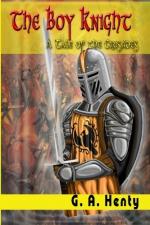The forces were about equal. The battle began by a discharge of arrows; but Robin Hood and his men shot so true and fast that they greatly discomfited the enemy; and King John’s mercenaries having but little stomach for the fight, and knowing how unpopular they were in England, and that if defeated small mercy was likely to be shown to them, refused to advance against the ranks of the loyal barons, and falling back declined to join in the fray. Seeing their numbers so weakened by this defection, the barons on the prince’s side hesitated, and surrounding the prince advised him to make terms with the barons while there was yet time. Prince John saw that the present was not a favorable time for him, and concealing his fury under a mask of courtesy, he at once acceded to the advice of his followers, and dispatched a messenger to the barons with an inquiry as to what they wanted of him. A council was held, and it was determined to demand the dismissal of the mercenaries and their dispatch back to their own country; also that John would govern only as his brother’s representative; that the laws of the country should be respected; that no taxes should be raised without the assent of the barons; that all men who had taken up arms against his authority should be held free; and that the barons on Prince John’s side should return peaceably home and disband their forces. Seeing, under the circumstances, that there was no way before him but to yield to these demands, Prince John accepted the terms. The mercenaries were ordered to march direct to London, and orders were given that ships should be at once prepared to take them across to Normandy, and the barons marched for their homes.
Satisfied, now that the mercenaries were gone, that they could henceforth hold their ground against Prince John, the royal barons also broke up their forces. Robin Hood with his foresters returned to Sherwood; and Cuthbert, bidding adieu to Sir Baldwin, rode back to London, determined to carry out the plan which he had formed. He was the more strengthened in this resolution, inasmuch as in the royal camp he had met a friend from whom he parted last in the Holy Land. This was Blondel, the minstrel of King Richard, whose songs and joyous music had often lightened the evening after days of fighting and toil in Palestine. To him Cuthbert confided his intention, and the minstrel instantly offered to accompany him.
“I shall,” he said, “be of assistance to you. Minstrels are like heralds. They are of no nationality, and can pass free where a man-at-arms would be closely watched and hindered. Moreover, it may be that I might aid you greatly in discovering the prison of the king. So great is the secrecy with which this has been surrounded that I question if any inquiries you could make would enable you to trace him. My voice, however, can penetrate into places where we cannot enter. I will take with me my lute, and as we journey I will sing outside the walls of each prison we come to one of the songs which I sang in Palestine. King Richard is himself a singer and knows my songs as well as myself. If I sing a verse of some song which I wrote there and which, therefore, would be known only to him, if he hears it he may follow with the next verse, and so enable us to know of his hiding-place.”




